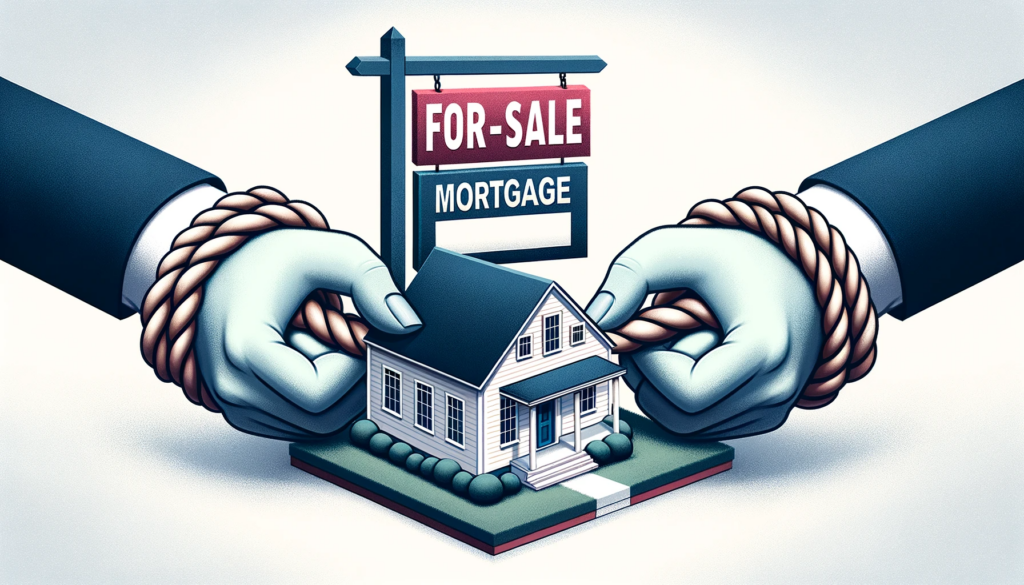
What Happens If You Sell Your Home Before Paying Off the Mortgage?
Welcome to our comprehensive guide on what happens when you sell your home before paying off the mortgage. As a homeowner thinking about selling, you may find yourself in a position where you need or want to sell your house before you’ve completed the payments. This article will guide you through this often complex process, equipping you with everything you need to know to make sure the mortgage is paid.
Is It Possible to Sell a Home With an Outstanding Mortgage?
Yes, it is possible to sell a house with a mortgage still owed. The key factor at play in this situation is home equity – the difference between the amount you owe on your mortgage and the current market value of your home. If you’re selling when the house value is less than the outstanding mortgage or if you’re in negative equity, the process can get tricky.
Understanding Home Equity and Negative Equity
Home equity is the value that you truly own in your home. For example, if the market value of your home is $250,000 and you owe $200,000 on your mortgage, you have $50,000 in home equity. Negative equity, conversely, happens when the outstanding mortgage balance is higher than the market value of the home.
Role of the Mortgage Lender in the Sale Process
The mortgage lender, or mortgage company, plays a significant role when you’re trying to sell your old home with an outstanding mortgage. They have a lien on the property, meaning they have a right to seize the home if you fail to make your payments. Thus, any sale would need their consent and would often go towards repaying the mortgage debt first.
Consequences for the Homeowner: What Does It Mean for Your Mortgage?
If you sell your house before paying off the mortgage, the sales proceeds will be used first to pay off the outstanding mortgage balance. If the sale price is more than what you owe on the mortgage, the leftover funds can be used for other purposes such as purchasing a new house or covering closing costs.
What Happens to Your Mortgage When You Sell Your House?
When you sell your home, the outstanding mortgage balance is typically paid off from the sale’s proceeds, basically transferring the debt from you to the new owner. This pay off process can also affect your ability to qualify for another mortgage for your next home.
Definitive Guide to Outstanding Mortgage Balances and Proceeds From the Sale
When you sell a house before paying off the mortgage, the proceeds from the sale are used to pay off the remaining mortgage balance. If the price you sell for is less than what you owe, you may need to conduct a short sale or come up with the difference out of pocket.
Understanding the Pay Off Process for Your Mortgage
The process of paying off your mortgage when selling your house begins with reaching out to your mortgage lender and asking for a payoff quote. This quote includes your outstanding mortgage balance and any additional fees or penalties associated with paying off your mortgage early.
Potential Risks of Selling Your House with a Mortgage Still Owing
You might face several risks if you are still owing on the mortgage at the time of sale. The major one is not getting enough from the sale to pay off the mortgage. It is also possible that you will have challenges securing a new mortgage loan due to credit implications from the original mortgage.
How to Handle Selling a House With Negative Equity?
If your home is in negative equity, selling becomes more complex. You might need to organize a short sale, where the mortgage lender agrees to accept less than what’s owed on the mortgage. Let’s explore these issues in detail.
Navigating the Complexities of a Short Sale
A short sale occurs when you sell the property for less than the outstanding mortgage balance with the mortgage lender’s approval. This can be a way to sell your home if you can’t keep up with the payments, but it might have serious consequences on your credit score.
What Happens if The Value of Your Home is Less Than You Owe?
If the value of your home is less than what you owe on your mortgage, the remaining mortgage debt doesn’t just disappear when you sell the home. You would typically need to make up the difference or negotiate a short sale with your mortgage lender.
Tips for Homeowners Struggling to Sell Their Old Home in Negative Equity
If you’re trying to sell your home in negative equity, it’s crucial to seek advice from a real estate professional and consider all options available, such as loan modifications or refinancing. Communicate with your mortgage company about the situation, as they might be able to offer solutions to help you sell and move on.
Using the Proceeds to Pay Off the Remaining Mortgage and Buy a New Home
If you sell your home and have leftover proceeds after paying off the mortgage, you can potentially use those funds as a down payment for a new home. But note, several other costs come into play when you buy a new home, like closing costs and possibly a new payment.
Understanding Extra Costs: Closing Costs and Cost of the New Mortgage
Closing costs are one of the significant additional costs to consider when you sell your house and buy a new one. This includes fees for appraisal, property taxes, escrow fees, and more. Furthermore, if you’re moving to a more expensive home, your payments are likely to increase.
Do You Qualify For a New Mortgage After Selling Your Home With a Mortgage?
Qualifying for a new mortgage after selling your home with an outstanding mortgage depends on various factors. These include your credit score and history, debt-to-income ratio, employment history, and how much you have for your down payment. In general, lenders want to ensure that you’ll be able to handle the new mortgage payments reliably.
Planning Your Mortgage Payment Schedule for Your New Home
Once you have decided on your new home, work with your lender to plan your mortgage payment schedule. This could be a 15-year or a 30-year mortgage, depending on your financial situation. A professional mortgage advisor can help you understand the best options for you.
What If You Try to Sell Your House Fast Before Paying the Mortgage?
Sometimes due to circumstances like job loss or relocation, you may need to sell your house fast. If you still owe on your mortgage, this could complicate things. But, with the right strategies, fast-selling is absolutely possible.
Exploring The Process of Selling Your House Assertively
When it’s time to sell fast, you’ll need to price your property competitively, market it aggressively and ensure it’s in show-ready condition. You might also consider selling to a real estate investor who can close quickly. But remember, if you sell your house before paying off the mortgage, the mortgage balance will be paid out of the sale proceeds.
Considerations for Fast-selling and Your Mortgage Payment
Speedy selling might be less profitable as you might need to accept a lower price to attract purchasers quickly. Therefore, it’s crucial to consider whether this could leave you enough to repay the outstanding mortgage and any additional costs associated with the sale.
When and How Should You Sell Your Old Home Fast: A Practical Guide
Fast-selling is a good idea if you’re facing foreclosure, planning a quick move, or if the cost of maintaining the property is too high. To achieve this, make sure to price the property right, prep your home for showing, and be ready for negotiation. Remember, your aim should always be to use the proceeds to pay off the mortgage and hopefully have some leftover for the next steps.
